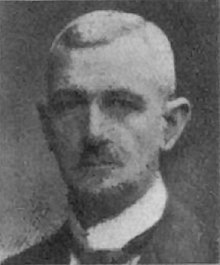Robert Bürgers
Robert Bürgers (born June 18, 1877 in Plittersdorf , Bonn district; † October 30, 1944 in Cologne-Lindenthal ) was a German banker and politician ( center ).
Life
After graduating from a high school in Cologne, Bürgers first studied law at the University of Lausanne and the Kaiser Wilhelms University of Strasbourg . In Strasbourg he became a member of the Corps Palatia in 1898 . As an inactive he moved to the Friedrich-Wilhelms-Universität zu Berlin and the Rheinische Friedrich-Wilhelms-Universität Bonn . The further stages of his training led him in 1901 as a trainee lawyer at the district court in Rheinbach and the regional court in Cologne and in 1903 as a government trainee lawyer in Schleswig. Bürgers passed his first state legal examination in 1901 in Cologne, the second followed in 1906. In 1903, Bürgers became a government trainee in Schleswig. In the years 1908 to 1910 Bürgers took leave of absence from his job. At that time he made extensive trips to the United States of America and East Asia. On his return he joined the Prussian Ministry of Commerce in 1910, where he was promoted to unskilled labor in 1911. In the same year he presented the font Kulturbilder aus dem United States of America , a result of his trip to the USA, in which he already predicted the future rise of the United States to become the greatest power in the world: “There will still be some difficulties, some struggles still to be survived; But whatever may come, a people that is inspired by such an energetic striving forwards and such indestructible optimism and self-confidence as the American, victory and the future belong to them after all. "
In 1912 Bürgers married. One of his nieces married the banker Hermann Josef Abs . In 1913, Bürgers was appointed District Administrator of Recklinghausen. In 1919, Bürger's advisory council was given to the Prussian Ministry of Finance, and a little later there was also the Secret Finance Council. The following year he resigned from civil service. Instead he became a board member of A. Schaaffhausen'schen Bankverein in Cologne. In addition, he began to become more involved in the Catholic Center Party . In the Reichstag elections in 1930 , Bürgers entered the Reichstag (Weimar Republic) as a Reich election proposal from the Center , to which he belonged until July 1932.
Bürgers was killed in an air raid in October 1944, late in the Second World War .
Fonts
- Cultural images from the United States of North America , 1911.
Web links
- Robert Bürgers in the database of members of the Reichstag
- Robert Bürgers in the files of the Reich Chancellery
Individual evidence
- ^ Kösener Corpslisten 1960, 33 , 116
- ↑ Quoted in Egbert Klautke: Unlimited possibilities: Americanization in Germany and France , 2003, p. 109.
- ↑ Lothar Gall: The banker Hermann Josef Abs. A biography , 2004, p. 98.
- ↑ Ulrich von Hassell, Ulrich Schlie: Römische Tagebücher und Briefe 1932–1938 , 2004, p. 319.
| personal data | |
|---|---|
| SURNAME | Citizen, Robert |
| BRIEF DESCRIPTION | German banker and politician (center), MdR |
| DATE OF BIRTH | June 18, 1877 |
| PLACE OF BIRTH | Plittersdorf |
| DATE OF DEATH | October 30, 1944 |
| Place of death | Cologne-Lindenthal |
